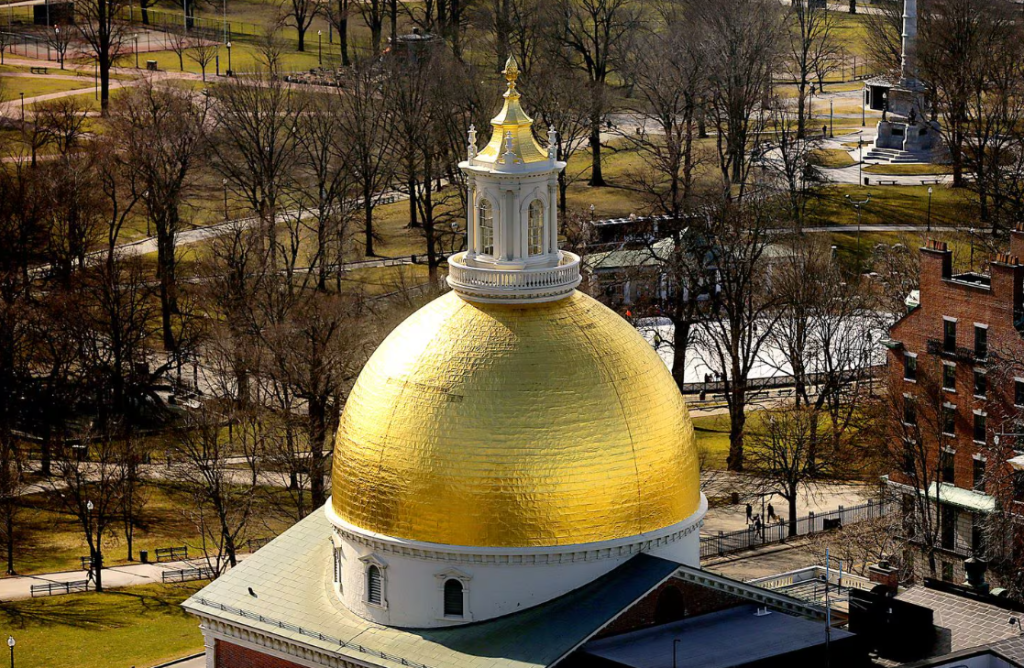【中美创新时报2024 年 5 月 20 日编译讯】(记者温友平编译)马萨诸塞州所谓的“百万富翁税”似乎准备好实际带来数十亿美元的收入。《波士顿环球报》记者马特·斯托特(Matt Stout)对此作了下述报道。
马萨诸塞州官员周一(20日)表示,选民批准的高收入者附加税在本财年创造了超过 18 亿美元的收入——距离实施还有三个月——这意味着州官员可能有数亿美元的盈余用于交通和教育 倡议。
预计收益已经比州长莫拉·希利 (Maura Healey) 和州立法者计划在 2024 财年(该计划实施的第一个全年)从其收入中支出的金额多出 8 亿美元。超出已预算 10 亿美元的额外筹集资金大部分将流入储备账户,州政策制定者可以从该账户中提取资金用于项目或计划的一次性投资。
税务部要到今年晚些时候才会确认官方筹集的金额。但这一估计立即支持了支持者的说法,即附加税将为该州带来急需的收入,尽管担心它可能会赶走该州一些最富有的居民。
“公平份额修正案的反对者声称,百万富翁宁愿逃离马萨诸塞州,也不愿缴纳新税,事实每天都证明他们是错的,”工会支持的马萨诸塞州提高组织的发言人安德鲁·法尼塔诺(Andrew Farnitano)表示,该组织是工会支持的组织,该组织推动了2022 年投票倡议的这项修正案的实施。
法尼塔诺说:“有了来自超级富豪的这笔钱,我们可以做更多的事情来改善我们的公立学校和大学,投资于道路、桥梁和公共交通,并开始建设一个惠及所有人的经济。”
选民于 2022 年批准了一项措施,对年收入超过 100 万美元的人额外征收 4% 的税。当时,左倾智库马萨诸塞州预算和政策中心预计该项目每年至少可以产生 20 亿美元的收入。
去年,州官员将他们的估计略低至 17 亿美元,议员们响应了经济学家的呼吁,限制了附加税的最初支出,因为第一年附加税的波动性可能太大,无法依赖。
到目前为止,它远远超出了这些预期,仅上个季度就产生了近 14 亿美元,恰逢 4 月份税收整体好于预期。
州政府官员表示,他们的税收总体收入比 4 月份的预期增加了 10 亿美元。这标志着与本财年早些时候的情况发生了明显逆转,当时的收款额落后于预期数月,促使州政府官员削减支出,下调收入预测,并于上个月冻结了一些州政府招聘。
希利的预算主管马特·戈兹科维奇(Matt Gorzkowicz)当时表示,官员们认为,大部分意外收入是由“百万富翁税”和资本利得税产生的,而州官员基本上无法用这些钱来平衡预算。
宪法规定附加税收入必须用于教育和交通项目,而资本利得的超额收入必须流向国家紧急储蓄账户。尽管如此,戈兹科维奇当时表示,州政府官员相信他们有望按照预测在 6 月底结束本财年。
近年来,马萨诸塞州一直在努力解决居民离开该州的问题。
根据先锋研究所的分析,2021 年,在“百万富翁税”生效之前,马萨诸塞州告别了调整后总收入总计 43 亿美元的纳税人,比上一年增长了 40%。数据显示,从马萨诸塞州迁出的纳税人比迁入的纳税人多了近 25,200 人。
波士顿基金会的研究机构 Boston Indicators 最近的一项分析发现,2021 年至 2022 年搬出马萨诸塞州的人主要是受过大学教育的中高收入者。
尤其可怕的是:工作年龄的成年人正在成群结队地离开。报告显示,2021 年和 2022 年,马萨诸塞州平均减少了 22,631 名 25 岁至 44 岁的人口,是所有年龄段中人数最多的,并且比前几年显着增加。
确切原因以及税收环境可能发挥了多大作用尚不完全清楚,因为该州还一直在努力应对住房危机,这场危机迫使家庭和其他人寻找更负担得起的地方。
同一项分析发现,随着移民数量从大流行时期的低点反弹,该州人口去年出现反弹,从 2022 年 7 月 1 日到 2023 年 7 月 1 日,居民增加了近 11,500 人。
倾向保守的马萨诸塞州财政联盟发言人保罗·克雷尼表示,“无论该州从收入附加税中获得什么短期经济利益,都会被这项税收对该州产生的长期负面影响所抵消。”
马萨诸塞州预算和政策中心临时主席菲尼亚斯·巴克桑德尔 (Phineas Baxandall) 周一表示,税收带来的收入不应令人震惊。他说,五年前的一项州分析预测,“百万富翁税”可能会产生近 20 亿美元的收入,而且“自那时起,收入进一步集中在顶层。”
“这并不奇怪,”他说。
该州预算负责人、州参议员迈克尔·罗德里格斯 (Michael Rodrigues) 周一在参议院表示,本财年税收超额收入最终可能接近 10 亿美元。根据语言立法者去年通过的规定,任何“超额”收入的 85% 都会转移到为一次性项目或支出保留的账户,例如道路维护、学校建筑项目或主要公共交通工程。
“我们不会在识别这些问题上遇到任何问题,”罗德里格斯说。 “众所周知,[交通和教育]是两个需求巨大的领域。”
本报告使用了州议会新闻社的材料。
题图:马萨诸塞州议会大厦。JOHN TLUMACKI/GLOBE STAFF/THE BOSTON GLOBE
附原英文报道:
‘Millionaires tax’ has already generated $1.8 billion this year for Massachusetts, blowing past projections
By Matt Stout Globe Staff,Updated May 20, 2024
Massachusetts’ so-called “millionaires tax” appears primed to actually deliver billions.
State officials said Monday that the voter-approved surtax on high earners has generated more than $1.8 billion in revenue this fiscal year — with still three months left to go — meaning state officials could have hundreds of millions of surplus dollars to spend on transportation and education initiatives.
The estimated haul is already $800 million more than what Governor Maura Healey and state lawmakers planned to spend from its revenue in fiscal year 2024, the first full year of its implementation. Most of the additional money raised beyond the $1 billion already budgeted would flow to a reserve account, from which state policymakers can pluck money for one-time investments into projects or programs.
The Department of Revenue won’t certify the official amount raised until later this year. But the estimates immediately buoyed supporters’ claims that the surtax would deliver much-needed revenue for the state despite fears it could drive out some of the state’s wealthiest residents.
“Opponents of the Fair Share Amendment claimed that multi-millionaires would flee Massachusetts rather than pay the new tax, and they are being proven wrong every day,” said Andrew Farnitano, a spokesperson for Raise Up Massachusetts, the union-backed group which pushed the 2022 ballot initiative.
“With this money from the ultra-rich, we can do even more to improve our public schools and colleges, invest in roads, bridges, and public transit, and start building an economy that works for everyone,” Farnitano said.
Voters approved the measure in 2022 to levy an additional 4 percent tax on annual earnings over $1 million. At the time, the Massachusetts Budget and Policy Center, a left-leaning think tank, projected it could generate at least $2 billion a year.
State officials last year put their estimates slightly lower at up to $1.7 billion, and lawmakers embraced calls from economists to cap what it initially spends from the surtax, given it may be too volatile to rely upon in its first year.
So far, it’s vastly exceeded those expectations, generating nearly $1.4 billion alone last quarter, which coincided with a better-than-expected April for tax collections overall.
State officials said that they raked in $1 billion more in tax revenue overall than they had projected in April. That marked a stark reversal from earlier in the fiscal year, when collections lagged expectations for months, prompting state officials to slash spending, downgrade their revenue forecast, and, last month, freeze some state hiring.
Matt Gorzkowicz, Healey’s budget chief, said at the time that officials believe most of the unexpected revenue was generated by the “millionaires tax” and collections from capital gains, all money that state officials largely can’t use to balance the budget.
Revenue from the surtax is constitutionally mandated to go toward education and transportation initiatives, while excess revenue from capital gains must flow to the state’s emergency savings account. Nevertheless, Gorzkowicz said then that state officials believe they’re on track to close the fiscal year at the end of June in line with projections.
Massachusetts has struggled with residents leaving the state in recent years.
In 2021 — before the “millionaires tax” took effect — Massachusetts said goodbye to taxpayers with a collective $4.3 billion in adjusted gross income, an increase of 40 percent from the prior year, according to an analysis by the Pioneer Institute. Nearly 25,200 more tax filers moved out of Massachusetts than moved in, the data show.
A recent analysis by Boston Indicators, the research arm of the Boston Foundation found that the people moving out of Massachusetts across 2021 and 2022 were predominantly middle- and high-income earners, and college-educated.
Particularly dire: Working-age adults are leaving in droves. On net, Massachusetts lost an average of 22,631 people ages 25 to 44 across 2021 and 2022 — the largest number of any age group and a marked increase over previous years, according to the report.
Exactly why — and how much the tax environment may have contributed — wasn’t completely clear, as the state has also struggled with a housing crisis that has pushed families and others to seek more affordable locales.
The same analysis found that the state’s population rebounded last year, with a gain of nearly 11,500 residents from July 1, 2022, to July 1, 2023, as immigration numbers rebounded from pandemic-era lows.
“Whatever short term financial benefit the state will receive from the income surtax will be outweighed by the long-term negative effect this tax is having on the state,” said Paul Craney, a spokesperson for the conservative-leaning Massachusetts Fiscal Alliance.
Phineas Baxandall, the Mass. Budget and Policy Center’s interim president, said Monday that the take from the tax shouldn’t be shocking. A state analysis five years ago predicted that the “millionaires tax” could generate nearly $2 billion, he said, and “income has further concentrated at the top since then.”
“This isn’t surprising,” he said.
State Senator Michael Rodrigues, the state’s budget chief, said on the Senate floor Monday that excess revenue from the tax could ultimately come close to $1 billion for this fiscal year. Under language lawmakers passed last year, 85 percent of any “excess” revenue is transferred to an account reserved for one-time projects or spending, such as road maintenance, school building projects, or major public transportation work.
“We will not have any problems identifying those,” Rodrigues said. “As we all know, [transportation and education] are two areas of immense need.”
Material from the State House News Service was used in this report.

